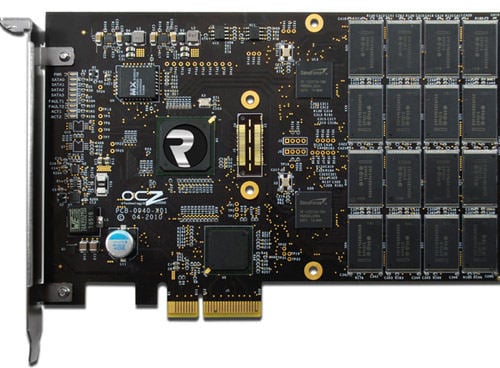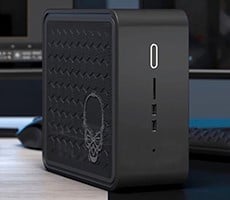18 Months Later: Origin's Genesis Desktop Revisited
The x1 slot at the top of the motherboard (just barely visible below the heatsink above) is made more difficult to use as a result of the bulge in the board's northbridge heatsink. Only ultra-short x1 cards can fit--cards with more than approximately two inches of PCB past the x1 connector will be blocked.
The SATA port just above the first x16 slot is best suited for hooking to an eSATA port mounted via PCI bracket. It's possible to run a cable internally, but drive bay placements make this tricky. Any cable must either arch over the GPU or take a 90º hook and run parallel to the card across most of the board.
The board's PCI slot (the black one, right about in the middle) had no trouble with a SoundBlaster X-Fi when just one Radeon 5970 was in use, but inserting and enabling the second GPU prevented the sound card from functioning properly. It would either fail to initialize at boot (no PCI device would be detected) or would blast static instead of audio as soon as playback was initiated.

OCZ's RevoDrive had similar issues when it came to playing nicely with the X58 SLI Classified. The card would only function after a BIOS update and only ran properly in certain PCIe slots. Because of how the GPU slots are configured on the EVGA board, there was no way to keep the Revo from sitting directly under one of the two Radeon cards. This proved to cause problems—during gaming, the GPUs became sufficiently warm such that the RevoDrive itself would overheat and crash.
These issues are not Origin's fault, as such. The company guarantees the system it ships in a given configuration, as opposed to guaranteeing it's perfect functionality with a bunch of additional third-party equipment installed. Given the price tag on the system, however, we're not sure the EVGA X58 SLI Classified was ultimately the best choice compared to some other high-end motherboards available at that time. Hindsight is 20/20.
As far as the motherboard's stability, we have no complaints. The base setup Origin shipped us in early 2010 remain functional more than halfway through 2011 in their overclocked configurations. We've stress-tested the system, allowed it to run full-bore in un-air-conditioned surroundings for six weeks--during the height of summer. We had one warranty issue--4GB of the 6GB originally shipped failed--but Origin resolved the matter to our satisfaction (more on this later).
The one component that's arguably aged not-so-well is the 80GB Intel SSD. While acceptably high-end when the system initially shipped, significantly faster drives are now available even as cost/GB has fallen. This, however, was expected of course. 80GB of space wasn't a particularly roomy option then, particularly given the need to keep a significant amount of drive space free. We've made do using no more than 60GB of the 74GB actually available, but it's been a tight squeeze and necessitated careful data management.
We're quite satisfied with how the system has held up over the past 18 months though--let's see if its performance is similarly acceptable.






